Ravi Prakash
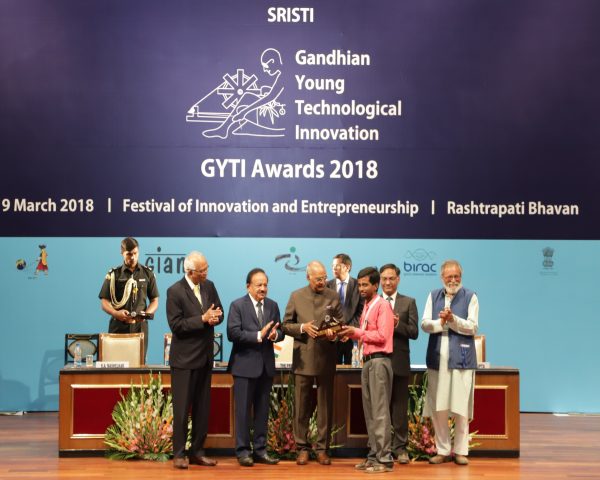
SITARE-GYTI Award 2018
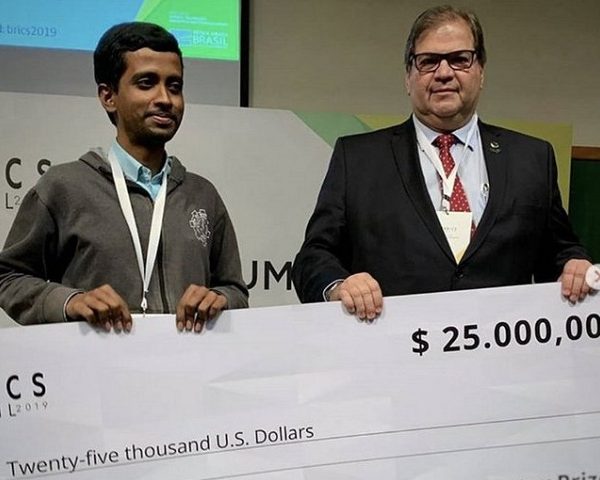
BRICS Award 2019
Mr. Ravi Prakesh, SITARE-GYTI 2018 Awardee, has received a grant of $25,000 under BRICS Young Innovator Prize-2019, honoured by the Ministry of Science, Technology, Innovation and Communications, Brazil. He also received DST-Lockheed Martin-Tata Trusts IIGP (India Innovation Growth, Program) Award-2019 (10 Lac INR research grant from DST, Govt. of India). Mr. Ravi Prakesh is currently perusing PhD with Dr Rekha R Menon group at NDRI, Bengaluru. The group is working on Processing of indigenous dairy products.
About the innovation
Cooling simultaneous to milking can be achieved by the Phase Change Material (PCM) based Milking cum Cooling Pail, thereby the time gap between milk production and milk cooling below the critical limit (10 ºC) can be highly minimized. It can help large number of small scale milk/dairy farmers for maintaining quality of milk and thereby consequent milk products, which indirectly have a great impact on overall economy of the country. Moreover, it will enhance the export rate of milk and milk products to foreign countries by maintaining quality from the point of production. Once milk is cooled below the critical limit, thereafter, just by applying insulation or maintained refrigeration in cold chain, the desired temperature below critical limit can be maintained easily till the time it reaches the processing plant; thereby the refrigeration cost in cold chain incurred due to bulk milk chillers and other milk cooling systems can be reduced.
Vikas Pandey
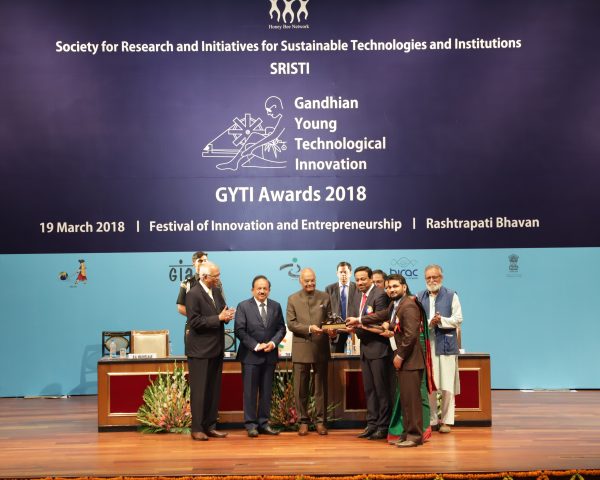
SITARE-GYTI Award 2018

Bill and Melinda Gates Foundation Grand Challenge Exploitation
Dr. Vikas Pandey, SITARE GYTI awardee 2018, and his team received the grant of 50 lakhs from BIRAC and bill and Melinda gates foundation through Grand Challenge Exploitation. Mr. Vikas is currently perusing PhD with Prof Ravikrishnan Elangovan group at IIT Delhi. The team is doing the excellent job, they are working on fluorescence spectroscopes. SeeTB device, upgrades the simple microscope to fluorescence microscope that is helpful in high sensitive TB detection through microscopy method.
About the innovation
Development of a compact total internal reflection fluorescence microscopy module for diagnosis of M. tuberculosis.
TB infection is one of the major healthcare problems in India. The bright-field sputum smear microscopy (SSM) is the most common method used for TB diagnosis in India, however SSM has poor sensitivity. Consequently, only 64% of total TB infected patients are being diagnosed and treated. Every single undiagnosed TB patient infects at least 10-15 healthy individuals, keeping the vicious disease cycle going. WHO has recommended LEDFluorescence Microscopy with higher sensitivity for TB diagnosis in high TB burden countries like India. The adoption of LED-FM has been slow mainly due to high cost (approximately~2lakhs INR after subsidy), additional infrastructure, training and maintenance of new fluorescence microscope. India has approximately 14000 RNTCP centers (each caters approximately 100,000 people), but only 2500 centers has LED-fluorescence microscopes. This diagnostic infrastructure gap between the actual requirement and availability is a major bottleneck. At IIT Delhi, We have developed a unique fluorescence microscopy technology, cTIRF: compact Total Internal Reflection Fluorescence”. The cTIRF converts a simple brightfield microscope to fluorescence microscope without any hassle of tedious illumination mechanism, optical filters, and additional lens installation. This 3D-printed module is highly compact (~approx size of calculator), robust, costeffective and allows rapid (lesser than 2mins) TB diagnosis without additional infrastructure, cost and training. While the sputum sample processing, smear preparation and auramine-O staining remains same as recommended by WHO. The clinical validation of cTIRF is running at 2 hospital sites. This affordable technology is a cost-effective way of upgrading the existing microscopes for fluorescence TB diagnosis. In alignment of Govt. of India mission to eradicate TB by 2025, the cTIRF can be a scalable solution for easy and rapid deployment across India.
Jayesh Kumar Sevantilal Mevada
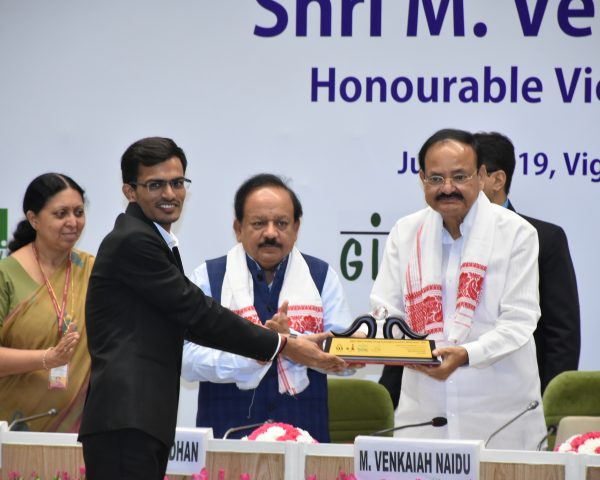
SITARE-GYTI Award 2019
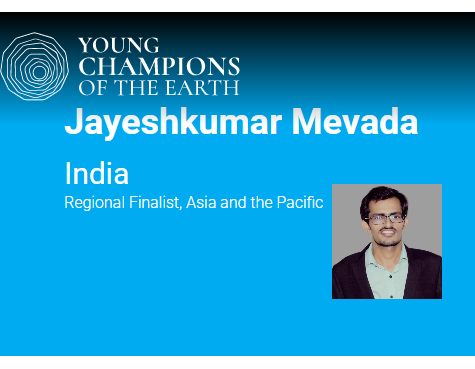
Young Champions of the Earth Award 2020 Finalist Asia-Pacific Region
Jayesh Kumar Sevantilal Mevada, SITARE-GYTI 2019 awardee –Nominated for Global Restoration Program- 2020 of UN. He was one of the Finalists of Young Champion of the Earth Award-2020 from United Nations. He also received the INAE- youth conclave award for excellence-2019 from INAE-Delhi. Apart from this he also received S.B Chandaliya Best research student and communicator award-2020, and also invited for Global Landscape Forum conference -2020. Currently, He is the Ambassador of Kesar Seva (NGO),Gujrat and founder and Director, Revoltech Technologies Private Limited, Gujarat. developing technology for valuable products from human hair waste. He also received funding under DST-WMT program (~ 76 lakh , PI – Professor A.B.Pandit, ICT,Mumbai).
About the innovation
The project of the novel hybrid technology for the bio-separation involved the exploration of the hydrodynamic cavitation for the controlled cell disruption and recovery of the intercellular biomolecules. The strategy for selective recovery of enzyme from the intercellular locations such as periplasm as well cytoplasm has been explored. The pretreatment strategy such as hypo-osmotic acidic/ alkaline stress condition in combination with the hydrodynamic cavitation found to be energy efficient method for the selective recovery of enzymes from the intracellular location. Furthermore, we have developed strategy for the one step recovery of extracted enzyme using novel dendritic ligands on the matrix with magnetic property. The developed strategy has a selectivity of more than 5 time selective and 15 times energy efficient as compared to conventional method.
Hydrodynamic cavitation is used for the partial damages of the microbial cell and release of the intracellular contents. This concept has been proven in this project. The release of the intracellular contents (enzymes) in extracellular medium facilitates the overall intracellular biological process. This concept we have taken forward for the two targeted applications that are for biogas generation digester and anaerobic/aerobic digester in the water treatment plant.

